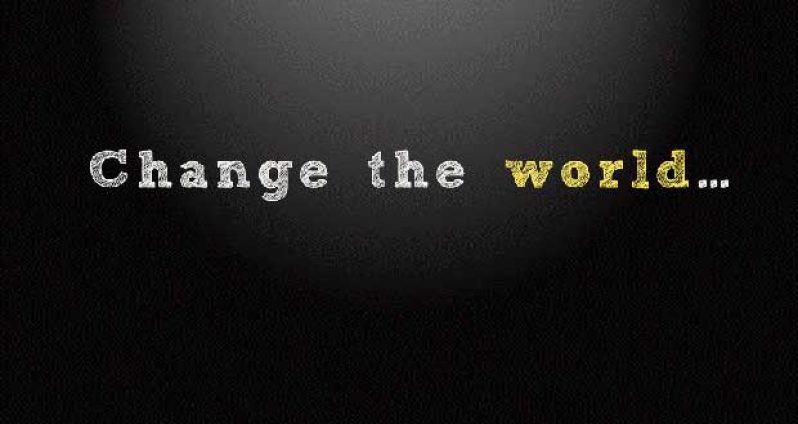IT WAS the German Philosopher and revolutionary, Karl Marx who famously wrote that “philosophers have interpreted the world in various ways; the point however is to change it.”
Change, it is said, is the only constant. As the French saying succinctly summed it up, ‘the more things change, the more they remain the same’.
The two sayings may appear contradictory, but on closer examination, they are not, and point to the dialectical nature of society, one in which change is inevitable but does not take place in a linear or a straight-line manner.
Lenin captured that point very well in his very lucid publication, ‘One Step Forward, Two Steps Backward’, in which he pointed to the dangers of moving too fast ahead of the masses without taking into account the objective and subjective factors which obtained at any given time.
According to Marxist scholars, we live in a material world, where everything changes. This is true of objects (material things) as it is true of society. Hence the term dialectical and historical materialism, which describes the changing nature of both Man and the physical environment in which he lives, as well as the society of which he is a part.
Put in a different way, we live in a changing and dynamic environment, where changes take place all the time. Take our own society: We started out as a slave society, in which the production relations and the mode of production were basically that of master and slave.
This was changed later on to one in which there was a semi-feudal production mode, where the peasants, especially on some parts of Essequibo, were tied to the system in an almost semi-feudal manner, whereby they were forced to almost empty their pockets at the hands of the big farmers who, in exchange for their labour, provided them with goods and other basic items from their shops.
The workers were doubly exploited, firstly in the form of low wages, and secondly from high profit margins from their business operations.
Guyana, after a hard and prolonged struggle waged by the PPP, managed to free the country from colonial rule, and earn its people the right to vote, regardless of literacy, income or property qualifications. The result of those developments were the election to office of the PPP administration, led by the late Dr. Cheddi Jagan; but just a mere six months later, the relatively advanced Constitution was suspended, and an interim pro-British administration installed in place of duly elected leaders.
Four years later, in 1957, elections were again held, and was convincingly won by the PPP, despite a split in the Party, engineered by Forbes Burnham with the support of foreign and local vested interests. The PPP went on to win the elections of 1961, but was again manipulated out of office in the elections of 1964, which saw the coming to power of a PNC-UF coalition government.
The democratic and constitutional gains made by the PPP were sooner eroded by the PNC administration, which rigged all elections from 1968 to 1992. Under pressure from democratic forces, both within and outside of the country, the PNC administration was forced to give in to democratic reforms, which saw the widely-anticipated PPP/C administration take the seat of Government after an absence of close to three decades.
The dialectics of change and development is once again playing out in present- day politics, both at the municipal and at the national levels. The current fiasco at City Hall between the Mayor and City Council and the City Clerk is a good case of municipal politics, which has almost reached hilarious proportions. The most recent Court ruling has deemed the actions of the Mayor and the City Council to remove Ms. Carol Sooba as Town Clerk ultra vires and outside of the limits of authority of the Council. It is interesting to see how the Mayor would respond to this ruling, having done everything possible to subvert the Office of the Town Clerk, and prevent her from carrying out her duties.
At the level of our national politics, the situation playing out in our parliament today is no less intriguing, with the combined parliamentary parties seeking to block spending on key and critical expenditure items, and using their one-seat majority to blacklist the country as is currently the case with its blunt refusal to support legislation to pass the anti-money laundering and countering of terrorism bill.
The history of Guyana’s politics, especially its post-colonial history, is basically one of struggle against reactionary and anti-democratic forces led by the PPP and now PPP/C administrations. In the end, the forces of progress have always prevailed over the forces of reaction. This is in keeping with the laws of historical and dialectical materialism, where, despite setbacks and temporary reversals, the forward march of history is inevitable and pre-determined.
Our country is, without doubt, on the forward march. The late Dr. Cheddi Jagan, during the days of PNC dictatorship, always reminded us that the struggle will be long and hard, but victory is inevitable.
We have come, as a country and as a people, a long way since the difficult days of colonial rule and PNC dictatorship. Guyana, today, is a free and democratic country that is well respected among the community of nations. We have shed our image as a pariah state, and we are now ranked not as a Less Developed Country but one that has advanced to the ranks of a middle-income country.
The PPP/C government must be given credit for this achievement, despite the several challenges it has had to contend with, both in terms of our domestic politics and a harsh international economic environment.
Guyana has undergone fundamental transformations, both in terms of our body politics and in our economic and social landscape. The challenge before us is to sustain our growth momentum in the face of a hostile political environment.
(By Hydar Ally)



.jpg)








